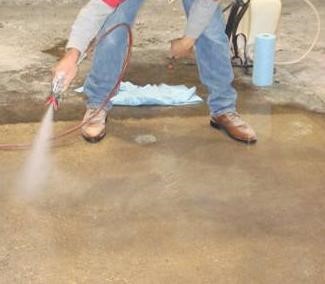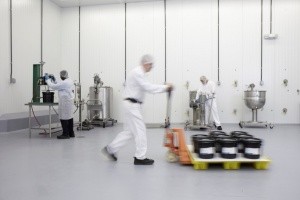Understand What Your Floor Needs
The most obvious answer to this question is to stress the importance of working with a polymer flooringexpert to recommend, specify and properly install the correct concrete coating or resurfacing system to address their unique performance requirements to ensure there is no concrete contamination. Proper floor and wall coating maintenance training, cleaning processes, and periodic reviews of your floors and walls can also go a long way in getting the most out of your floor and wall coating investment.
There are also a number of things that can be done prior to the pouring of the concrete substrate during the new construction phase. Utilizing the right concrete mix design, using a quality vapor barrier material, or utilizing various concrete admixtures can contribute to the life cycle of your concrete floors and walls.
 Consider a Pre-Treatment Option
Consider a Pre-Treatment Option
But the simplest, and most effective, suggestion we would offer is to pre-treat your concrete or block substrates with an antimicrobial colloidal product prior to installation of a polymer coating or resurfacing system. We recommend this process anytime you have to the opportunity to get down to bare concrete, whether during new construction or a concrete rehabilitation project.
This easy-to-apply, cost-effective, product (Protect AM-PT) penetrates up to six inches into your concrete substrate, where it reacts with the free alkali and forms an aqueous gel, hydrostatically filling the voids and capillaries deep within your substrate with an antimicrobial presence. This pre-treatment process also offers a number of side-benefits, including:
- Limits moisture and vapor transmission
- Reduces undercutting of coatings in wet environments
- Penetrates floors 3” to 6”
- Permanently integrally seals concrete
- Preserves matrix integrity
- Increases surface abrasion resistance
- Adds density to concrete
- Improves thermal resistance
- Increases concrete strength
- Improves past carbonation effects
- Zero VOC/VOS content
- Improves acid/chemical resistance
- Lowers internal chemical reaction potential
- Helps avoid concrete contamination
 Stay Ahead With an Additional Barrier of Antimicrobial Protection
Stay Ahead With an Additional Barrier of Antimicrobial Protection
For industries like food and beverage, healthcare and pharmaceutical manufacturing, this extra application is a smart, preventive measure that can assure redundant antimicrobial protection, even if the antimicrobial concrete coating or topping cracks, or expansion joint treatments fail due to building shift or concrete expansion. Specifically, in the food & beverage processing industry, this fits in very well with FSMA (Food Safety Modernization Act) and HACCP (Hazard Analysis and Critical Control Points) protocols that make for food safe flooring.
The additional cost of adding this extra step is nominal, typically adding only about 10% to the total cost of the floor or wall coating system. By pre-treating your concrete floor or wall substrate with an antimicrobial concrete densification project, you can achieve a host of benefits, but most importantly the peace of mind that your concrete has an active antimicrobial presence that will help combat concrete contamination for years to come.
Is contamination a hot-button topic in your food facility? Want to learn more about protecting your building envelope? Click here to access our multimedia kit: “Effectively Control Floor & Wall Contamination”


